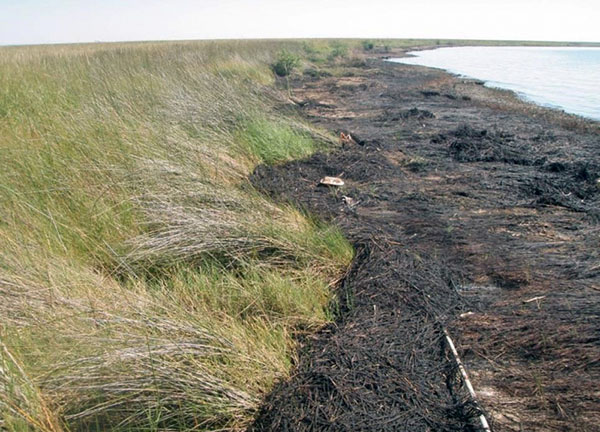Impacts and Recovery of Salt Marshes after Oiling
NOVEMBER 22, 2021 — OR&R biologist Nicolle Rutherford was among the authors of a paper recently accepted for publication: “Meta-analysis of salt marsh vegetation impacts and recovery: a synthesis following the Deepwater Horizon oil spill.”

The paper is now available online in “accepted article” format, having undergone full peer review but not having undergone copyediting, typesetting, pagination and proofreading. The paper will be available as open access.
Marine oil spills continue to be a global issue, heightened by spill events such as the 2010 Deepwater Horizon spill in the Gulf of Mexico, the largest marine oil spill in U.S. waters and among the largest worldwide, affecting over 1,000 km of sensitive wetland shorelines, primarily salt marshes supporting numerous ecosystem functions.
To synthesize the effects of that oil spill on foundational vegetation species in the salt marsh ecosystem, Spartina alterniflora and Juncus roemerianus, the authors performed a meta-analysis using data from ten studies and 255 sampling sites over seven years post-spill. They examined the hypothesis that the oil spill reduced plant cover, stem density, vegetation height, aboveground biomass, and belowground biomass, and tracked the degree of effects temporally to estimate recovery time frames.
The paper combines datasets from the Deepwater Horizon oil spill response, Natural Resource Damage Assessment, and Gulf of Mexico Research Initiative datasets to look at longer-term marsh vegetation impacts and recovery. This includes several data sources linked to NOAA OR&R studies and funding.
The authors concluded that the Deepwater Horizon spill had multi-year impacts on salt marsh vegetation, with full recovery likely to exceed ten years, particularly in heavily oiled marshes where erosion may preclude full recovery. Vegetation impacts and delayed recovery likely exerted substantial influences on ecosystem processes and associated species, especially along heavily oiled shorelines.
Their synthesis affords a greater understanding of ecosystem impacts and recovery following the Deepwater Horizon oil spill, and informs environmental impact analysis, contingency planning, emergency response, damage assessment, and restoration efforts related to oil spills.
For further information, contact Nicolle.R.Rutherford@noaa.gov.
